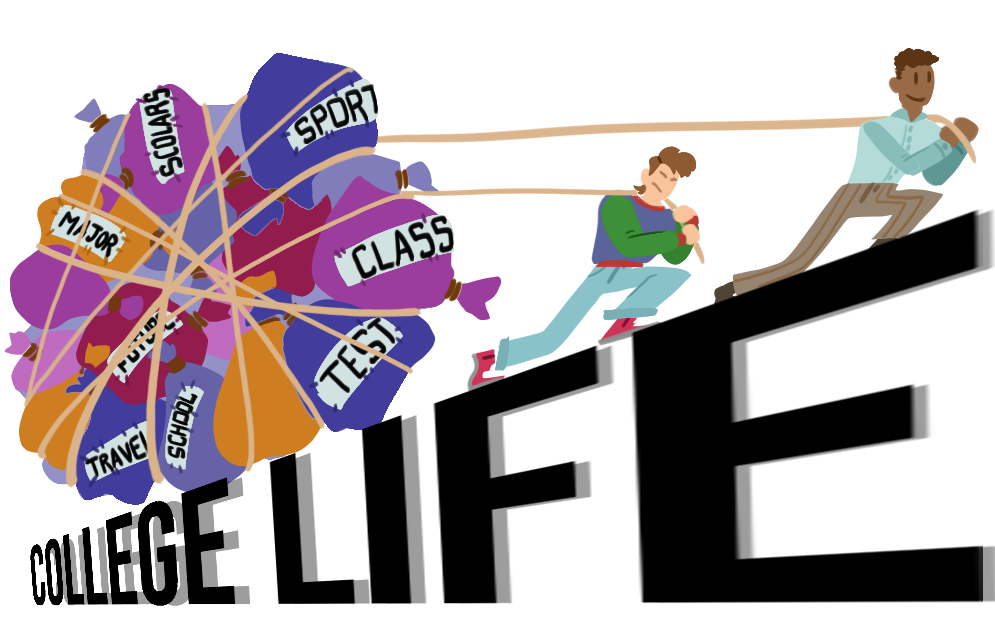Traditionally, guidance counselors help students plan the classes they need to graduate, assist them in coordinating their schedules, and guide students through emotional struggles or crises. However, most of their focus should be on guiding students in their selection of colleges, applying for financial aid, and ensuring that the classes they take now prepare them for college-level courses.
Huge Caseloads
Most guidance counselors have tremendous workloads, some nearing 1,000 students, which is four times the recommended cap. “The average counselor-student ratio in our country is now 1 to 459—almost double that recommended by the American School Counselor Association, which is 1 to 250” (The Education Trust).
With such an overwhelming student-to-counselor ratio, it is impossible for a guidance counselor to help students in crises effectively and to assist each child in making the best decisions about what to do when they leave high school. “…[W]hen school counselors allow 20 percent of their students to take up 80 percent of their time, in effect, 80 percent of the students do not get properly prepared for college and career” (The Education Trust). Many students who seek help finding out about college options do not get adequate time with a guidance counselor, nor do they receive the resources to educate themselves.

The Problem
Our nation faces a difficult situation: Currently, many high school students graduate without the skills they need to obtain entry-level jobs or academic skills to get into college. “The lack of academic rigor in high school closes the doors to good jobs, success in college, and, all too often, access to the middle class” (The Education Trust). If properly trained and utilized, guidance counselors are critical in changing future generations’ trajectory.
Hindsight is 40%
Ultimately, researching colleges and financing is up to the student and his parents. However, they need a professional to guide them in choosing preparatory coursework. “A College Board survey of graduates from the class of 2010, conducted one year after commencement, found that 40 percent wished they had taken different courses in high school” (The Education Trust). How are families getting their information on which courses to take? With 40% of surveyed college freshmen wishing they had taken different classes, it seems to indicate that there is an information void.
Are Counselors Helping?
How much are guidance counselors helping students? “An estimated 20 to 50 percent of students enter college as “undecided,” and an estimated 75 percent of students change their major at least once before graduation” (The Mentor). The limited time students spend with guidance counselors doesn’t seem to get them any closer to selecting a right major.
Many students who took part in a study stated that their guidance counselor did not have any impact on the major they chose. According to the study, to select a major, students say that “factors that played a role include a general interest the student had in the subject he or she chose; family and peer influence; and assumptions about introductory courses, potential job characteristics, and characteristics of the major” (The Mentor). “…[S]students are choosing a major based on influence and assumption rather than through an understanding of their personal goals and values” (The Mentor).
Selecting a Major
When students live most of their lives with their families, they haven’t had to make crucial decisions on their own; their ability to know who they are and predict what will be best for them is limited. To pick a major, students need not only in-depth knowledge and understanding of potential professions but also how they will react under stress. Until they have some independence and need to make crucial decisions on their own, they won’t know how the answers to these questions.
Likewise, they need to understand what the job will be like on bad days if they will have to relocate, work long hours, or give up hobbies for their chosen career. To have a complete picture, they need to research, talk to professionals in the field, shadow them, and explore many options. While a guidance counselor can help students select the right classes, use technology to perform research, and arrange for introductions to professionals, their role in contributing to choosing a major is limited.
Research suggests that choosing a major before entering college is not possible and certainly can’t happen in a guidance counselor’s office. “… They (students) may not yet be developmentally ready to make important life decisions without a structured period of self-reflection, learning, and growth. When making decisions independently or based on the opinions of those with whom they have a personal relationship, such as family members, students will most likely make an uneducated, unrelated, and ineffective decision not based on their true personal goals, interests, and values” (The Mentor).
Information Void
Guidance counselors should have a thorough understanding of the various kinds of state and private financial aid, assist families to understand what kind of aid they qualify for, and help students and families fill out financial aid and scholarship forms. “And 40 percent said they failed to get the guidance needed to understand the college application and financial aid processes” (The Education Trust). Nearly half of the students do not learn about even a fraction of their college options or how to finance their education. Each year, many options college options are left unexplored, mainly because a guidance counselor did not make sure that students know to look into a wide range of choices.
Job Description
Because many school principals are not trained in working with, supervising, and mentoring guidance counselors, they often utilize them as well-paid administrative assistants. Principals charge guidance counselors with coordinating standardized testing, substitute teaching, and providing lunch, bus, and hallway supervision duty.
The Problem Starts in Grad School
Because most guidance counselors take their master’s degree classes with mental health and other counseling professionals, most of their programs focus on providing individual and small group therapy, not on the educational component of their job. To make matters worse, they may not have even had a school practicum. Usually, most guidance counselors only receive on-the-job training to help students apply for colleges and financial aid. Due to their lack of educational training, guidance counselors are often more skilled at working with homeless students or those in a crisis than to encourage students in danger of heading nowhere to take more rigorous coursework.
A New Focus
Rather than therapy being the focus of their work, guidance counselors should focus on urging all students to take rigorous classes that will prepare them for college or to succeed in their first job. Guidance counselors “have access to reams of data assessments results, enrollment patterns, attendance rates… keen insight into which students (including which groups of students) are on a dead-end path, which students are en route to a solid high school education that will produce real choices, and which students are somewhere in between” (The Education Trust). They need to leverage this information to implement programs that will help them have more meaningful interactions with the students on their caseloads and shows the significance of taking high school classwork seriously.
When students are struggling academically or having problems at home, it is the guidance counselor’s role to bring together the child’s teachers and family to begin to resolve emotional and school struggles. A school psychologist or private clinician should provide any subsequent therapy. Taking these measures will help lower a guidance counselor’s caseload and allow them to focus on the academic component of their job.
Help for Guidance Counselors
Regularly bringing in professional community volunteers can help ease guidance counselors’ caseloads. They can talk to students about different career paths and schedule job shadowing times.
Other ways to ease guidance counselors’ workloads include using or using more career assessments, helping students research potential careers, providing opportunities to job shadow for a day, and allowing students to sit in on more challenging classes.
Necessary Changes

It’s imperative that master’s degree programs for guidance counselors change, so they all have an educational, not a therapy-based focus. Also, all future guidance counselors must complete a school-based practicum before working in a high school. School principals need training on how to work with and mentor guidance counselors and allow them to spend their full day with the students on their caseload rather than working on administrative tasks.
If utilized correctly, guidance counselors can change the trajectory of the next generation of students. “They also know which courses or teachers produce the most failures and successes, which policies hold students back, and which instrumental supports help” (The Education Trust). With a few policy and administrative changes, the next wave of guidance counselors can mold and positively influence students without regrets.
Originally published on the Zealousness blog in 2017. Revised and updated in 2022. Read more education-related articles on Zealousness blog Education – iN Education Inc. (ineducationonline.org)
Works Cited:
- The Mentor: An Academic Advising Journal, https://dus.psu.edu/mentor/2013/06/disconnect-choosing-major/
- The Education Trust: “Poised to Lead: How School Counselors Can Drive College and Career Readiness, December 2011, http://edtrust.org/wp-content/uploads/2013/10/Poised_To_Lead_0.pdf

















